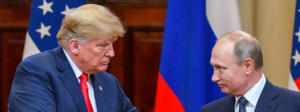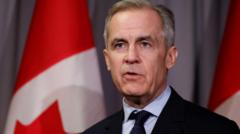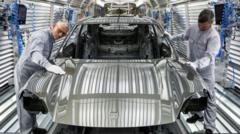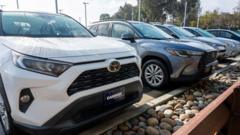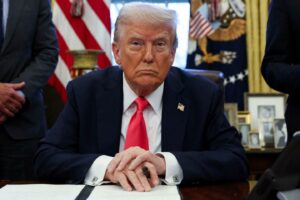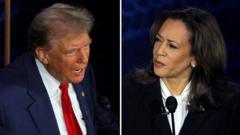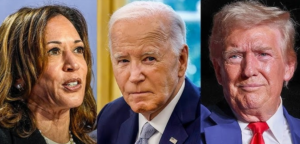As the US prepares for the imposition of 25% tariffs on foreign cars and parts, consumers and dealerships alike brace for the financial strain this unprecedented trade measure could cause, with prices expected to rise significantly.
Car Buyers Face Uncertain Future as US Auto Tariffs Loom

Car Buyers Face Uncertain Future as US Auto Tariffs Loom
Americans brace for prices to soar as sweeping auto tariffs are set to take effect next week.
In less than a week, the landscape of car buying in America is set to change drastically. Jeannie Dillard, a Virginia resident saving diligently on her limited income to replace a stolen vehicle, now faces a potential hike in prices due to new tariffs announced by President Donald Trump. The impending tariffs, which will impose a 25% tax on automobiles and auto parts imported into the US, are projected to kick in on April 2, causing concern among buyers about the future affordability of vehicles.
Dillard expressed her anxiety at a local used car dealership, admitting she’s uncertain about proceeding with a purchase: “If prices get too high, I’m obviously not going to buy something that I can’t afford.” Similarly, car dealers like Mohamad Husseini have voiced concerns that the financial burden of tariffs will inevitably be passed on to consumers. "The prices in the wholesale market have skyrocketed already,” he remarked, predicting steep increases in prices within weeks.
As an economic debate rages, Trump claims that the tariffs will bolster American job growth and manufacturing, though many experts predict a rise in consumer prices and curbed access to affordable vehicles. Robin Sloan, another potential buyer, voiced her skepticism about switching to domestic vehicles just because of tariff-induced price changes. “I think I would probably wait a few years until things settle down,” she said.
Auto ownership is a vital aspect of American life; roughly 92% of households own a vehicle, and cars symbolize personal freedom and success. Experts warn that the tariffs not only threaten to inflate prices on all vehicles but could also limit choices for consumers, particularly affecting lower-priced Korean models.
John Heitmann, an automobile historian, stated, “Consumers will not benefit; prices will go up, particularly among more affordable vehicles.” He also highlighted potential impacts on vintage car parts, with uncertainty looming over the hobbyist community.
The extensive interdependencies of the US auto industry with markets in Canada and Mexico mean that even American-made vehicles may see price hikes due to tariff repercussions. With forecasts suggesting that imports could decrease by 75% and average US car prices might rise by 5%, the auto industry is preparing for profound changes.
Despite opposition from some automakers, others, like Hyundai, have announced significant investments in the US, reflecting a complex response to the tariffs. As ramped-up economic pressures hit, many consumers, like Mya Fountain-Bunch, are opting to maintain their current vehicles. "I’m making sure that my car is working," she explained, hoping to avoid the market dynamics imposed by the new tariff strategy.
As uncertainty looms over the car market, consumers and dealer alike are left to navigate a rapidly shifting landscape, awaiting the full impact of the impending tariffs. The auto industry stands on the brink of a new era shaped by the unfolding realities of Trump’s trade policies.
Dillard expressed her anxiety at a local used car dealership, admitting she’s uncertain about proceeding with a purchase: “If prices get too high, I’m obviously not going to buy something that I can’t afford.” Similarly, car dealers like Mohamad Husseini have voiced concerns that the financial burden of tariffs will inevitably be passed on to consumers. "The prices in the wholesale market have skyrocketed already,” he remarked, predicting steep increases in prices within weeks.
As an economic debate rages, Trump claims that the tariffs will bolster American job growth and manufacturing, though many experts predict a rise in consumer prices and curbed access to affordable vehicles. Robin Sloan, another potential buyer, voiced her skepticism about switching to domestic vehicles just because of tariff-induced price changes. “I think I would probably wait a few years until things settle down,” she said.
Auto ownership is a vital aspect of American life; roughly 92% of households own a vehicle, and cars symbolize personal freedom and success. Experts warn that the tariffs not only threaten to inflate prices on all vehicles but could also limit choices for consumers, particularly affecting lower-priced Korean models.
John Heitmann, an automobile historian, stated, “Consumers will not benefit; prices will go up, particularly among more affordable vehicles.” He also highlighted potential impacts on vintage car parts, with uncertainty looming over the hobbyist community.
The extensive interdependencies of the US auto industry with markets in Canada and Mexico mean that even American-made vehicles may see price hikes due to tariff repercussions. With forecasts suggesting that imports could decrease by 75% and average US car prices might rise by 5%, the auto industry is preparing for profound changes.
Despite opposition from some automakers, others, like Hyundai, have announced significant investments in the US, reflecting a complex response to the tariffs. As ramped-up economic pressures hit, many consumers, like Mya Fountain-Bunch, are opting to maintain their current vehicles. "I’m making sure that my car is working," she explained, hoping to avoid the market dynamics imposed by the new tariff strategy.
As uncertainty looms over the car market, consumers and dealer alike are left to navigate a rapidly shifting landscape, awaiting the full impact of the impending tariffs. The auto industry stands on the brink of a new era shaped by the unfolding realities of Trump’s trade policies.







